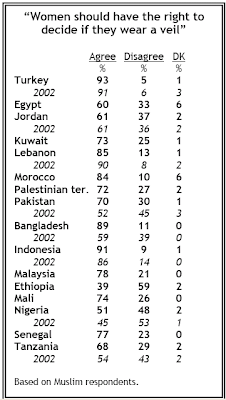A necessary component of the "block vote" strategy is the faulty assumption that Muslims either have uniform political views or are indifferent enough to drop them in favor of a recommendation by Muslim leaders. But every survey of Muslim political opinion shows a wide variety of views on issues ranging from national security and foreign policy to education and trade. While some Muslims conservative values are in line with the Republicans, their social justice, civil rights, and foreign policy viewpoints are sometimes more in line with the Democrats. In the current race, many Muslims also admired Ron Paul's fiscally conservative, anti-war bent.
It is unreasonable to expect, and unfair to encourage, Muslim voters to drop these personal political leanings in favor of a dictate from above. To do so would be to mirror dysfunctional electoral politics in less-sophisticated democracies, where voters cede their responsibility to be informed decision makers, casting their votes largely along ethnic or tribal lines. This approach can only lead to political apathy and atrophy in the Muslim electorate - the exact opposite of what the Muslim American community needs.
I have to agree. Shahed discusses a bit of the history of the muslim bloc in 2000 and 2004 and illustrates in both cases how dysfunctional and meaningless the bloc was in practice.
However, I can't agree to the prescription that he offers as an alternative:
Instead of focusing on orchestrating a block vote, Muslims must be (or should have been) encouraged to focus on issues at grassroots levels, and not be swayed by personalities, throwaway overtures, or one-time favors. Interest groups of every persuasion are effective at promoting their issues because they work with politicians across the spectrum, at all levels, from local to national. Muslim leadership should be enabling this by opening doors for Muslims to get involved in this way, and not just during an election year. And rather than swinging from Democrat to Republican, as the last two endorsements have done, Muslims should be encouraged to become involved in the political party of their choice, staying true to their own ideals.
This is a laudable suggestion for civic involvement, but is a universal strategy rather than one of particular or unique relevance to the muslim community. In essence, it surrenders the idea that muslims have a political identity in america all their own. That idea is certainly open for debate; the point about the diversity within the muslim community is well-taken. However, is there really no broad umbrella principle we muslims can look towards as a point of commonality?
To answer that question, we as a community need to first decide just what muslim "issues" are. As I have argued previously, these issues will necessarily be both muslim and American; therefore there will be issues of social justice such as Darfur and Palestine in which we might have an emotional stake, but which are not strictly within the boundary of our collective political self-interest.
A good example, again, is Obama, whose position on the Israeli-Palestine issue is pretty run of the mill (rhetoric about balanace, in practice will do nothing to upset the status quo). However, as regards to Pakistan, Obama alone has spoken of a post-Musharraf, pro-democracy policy instead of the pro-stability policy of administrations past, and ties US aid to Pakistan directly to the performance of the Paksitani government in rooting out the extremist enclaves. This is a refreshing approach to Pakistan policy and one that will be of significantly more relevance to the muslim community (given its large fraction of members of Indopak heritage) than Israel-Palestine.
Unlike the AMT endorsements of Bush in 2000 and Kerry 2004, where the parameters of the decision were decided by a relatively small group of self-appointed muslim leaders, any decision on what constitutes an American muslim policy platform needs to be made in consultation with the community. Ideally, a panel for discussion at next year's ISNA conference could be expressly devoted to fleshing out muslim concerns and identifying topics of relevance. Such a panel would not be tasked, initially, with anything more than simply identifying such areas of concern. However, follow-up panels would be required to devote attention to the topics in turn, and perhaps also fund polls to assess how well they are tracking genuine muslim american opinion. Ultimately, I envision a convention structure with delegates appointed/elected from within all muslim organizations and groups, who could meet in a political Shura whose ultimate aim would be to define the issues platform. If we embrace the mechanism of party politics, we can leverage them to truly give ourselves voice. This can be done under the banner of our cultural and religious identity rather than despite it.
